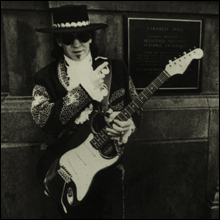![[Sidebar]](/standard/image/sidebar.gif)
![[Music Reviews]](/standard/image/headers/music_reviews_header.gif)
| clubs by night | club directory | bands in town | concerts | hot links | reviews & features |
The blues can be uptown and pretty or as nasty as a cornered rat. If your tastes run toward the latter, there's been a bunch of mean-old-blues albums hitting the stores lately that you might want to check out. Mean old blues
Five new CDs with brass-knuckled attack
by Ted Drozdowski
The most obvious is Stevie Ray Vaughan and Double Trouble Live at Carnegie Hall (Epic). For the late guitar firebreather, this 1984 concert was a dream come true. For those in attendance, it was a sonic nightmare. The amps were too loud, and Carnegie Hall's acoustics played slice-and-dice with the sound blasting off the stage. But savvy recording left us with a great performance on this CD, capturing Vaughan in his ascent with his trio fleshed out by Dr. John on piano, the Roomful of Blues Horns, and Austin singer Angela Strehli (who's first-rate on "C.O.D.").
STEVIE RAY VAUGHAN
Vaughan's playing is all white heat and blue soul. He was especially focused that evening (his birthday), since he saw the event as a chance to pay respect to his blues heroes by carrying their music into the posh establishment. So in addition to Vaughan's signature numbers like "Pride and Joy" and the instrumentals "Scuttle Buttin' " and "Lenny," you'll hear him biting into tunes by Albert Collins, Guitar Slim, and Albert King with precision and heart.There's less teeth-gritting meanness in three new reissues from the vaults of Memphis's obscure High Water label, but these albums by Jesse Mae Hemphill, R.L. Burnside, and Junior Kimbrough are torchlights for a style of music unaffected by rock and roll. Together, Hemphill's Feelin' Good (a Handy winner in 1991), Burnside's Sound Machine Groove (from 1980), and Kimbrough's Do the Rump! (from a 1982 single and unreleased 1988 sessions) define the turf of second-generation north-Mississippi hill-country blues.
The influence of earlier masters Fred McDowell and Bukka White can be heard in the one-chord guitar vamps and Burnside's glide-and-quaver slide. But deeper -- and far older -- are the echoes of Africa in all three albums. Kimbrough's rumbling, unstoppable rhythm seems built on the foundation of north-African small-group drumming. He sets the cadence on guitar, and the bass and drums repeat the lines he plays with slight variations. Those who've found Kimbrough through his more recent recordings for Fat Possum Records will note the higher range and clarity of his vocals on Do the Rump!, which was recorded before his early-'90s stroke.
The African-American fife-and-drum band tradition reverberates in Hemphill's delightful CD. The sound of Mississippi fife and drum is an off-the-slave-boat mix of multitimbral percussionists weaving tight polyrhythms under the vocal-like melodies of a hand-carved-reed player. Today, it's nearly extinct. Especially since Jesse Mae fell victim to a stroke that left her unable to play. But when this album was recorded, she was at the top of her game.
On Feelin' Good she incorporates fife-and-drum polyrhythms into her blues band to create a fresh hybrid. But what's best in these percolating arrangements is her own guitar (she also drums), which hums out a ghostly rhythmic pulse, and her alto voice, which seems world-wise enough to be drawing on centuries of experience. Musically, she was. At the time Hemphill cut Feelin' Good, she was at least the sixth generation of her family to lead a fife-and-drum group. Now, to my knowledge, only one still exists: Othar Turner's Rising Star Fife and Drum Band.
Burnside's Sound Machine Groove recasts the Howlin' Wolf classic "Sitting On Top of the World" in a fife-and-drums-influenced instrumental arrangement. Burnside's guitar plays the role of the piper, and the beats roll beneath him. At this point, Burnside's voice was higher -- less rich but perhaps more flexible. And his playing caught the nexus of the Mississippi hills and Memphis, an hour to the north. His lineup, which featured two of his sons and Calvin Jackson (the father of his current drummer, Cedric Burnside), had a more urban edge, incorporating touches of funk and bearing a debt to the driving, fatback sound of Albert King.
From further south, in the Mississippi Delta, comes Robert "Bilbo" Walker, who recently made his recording debut with Promised Land (Rooster Blues). You want mean? Listen to his junkyard-dog howl and the everything-on-"10" tone of his slow-picked, screaming guitar. Old? Well, he's no spring chicken, so don't let his hairpiece or gold glitter-trimmed jumpsuits fool you. And man, what Walker plays sure is the jukehouse blues in its most authentic, wart-marked contemporary form. On any given night in any joint from Clarksdale to Vicksburg, this is what the bad-ass stuff sounds like, raw and unleavened -- right down to the cross-currents of Muddy Waters, Hank Williams, and Chuck Berry you'll hearing swirling through the tunes. Nasty as a cornered rat -- and all the more beautiful for it.
| home page | what's new | search | about the phoenix | feedback |
Copyright © 1997 The Phoenix Media/Communications Group. All rights reserved.
